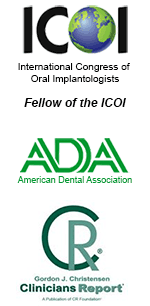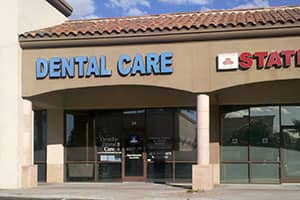TMJ and Tooth Grinding, Tooth Clinching Disorder
Pain or dysfunction of the hinging joints of the jaw can result in dental damageTemporomandibular Joint Disorder (TMJ)
 Pain or dysfunction of the hinging joints of the jaw is commonly referred to as “TMJ”. TMJ is actually the abbreviation of the joint, and Temporomandibular Joint Disorder is the term used to label problems involving the TMJ and the muscles, tendons, ligaments, blood vessels, and other tissues.
Pain or dysfunction of the hinging joints of the jaw is commonly referred to as “TMJ”. TMJ is actually the abbreviation of the joint, and Temporomandibular Joint Disorder is the term used to label problems involving the TMJ and the muscles, tendons, ligaments, blood vessels, and other tissues.
TMJ can result in abnormal wear patterns of the in the teeth. Over time, dental damage will usually occur. TMJ is the leading cause of tooth enamel damage and a significant cause of tooth loss and gum recession.
People with TMJ may also grind their back teeth, which will wear down the cusps of the occlusal surface. TMJ can be loud enough to wake a sleeping partner. Some individuals will clench the jaw without significant lateral movements. Teeth hollowed by previous decay or dental drilling, may collapse, as the cyclic pressure exerted by TMJ is extremely taxing on the tooth structure.
TMJ Symptoms Patients may present with a variety of symptoms, including:
- Anxiety
- Cracked and chipped teeth
- Jaw Pain or Stiff muscles around your jaws
- Stress or Tension
- Depression
- Earache
- Eating Disorders
- Insomnia
- Headache
Eventually, TMJ shortens and blunts the teeth being ground, and may lead to myofacial muscle pain and headaches. In severe, chronic cases, it can lead to arthritis of the temporomandibular joints. The jaw clenching that often accompanies TMJ can be an unconscious neuromuscular daytime activity, which can be treated as well.
TMJ Treatments
The cause of TMJ and the prescribed TMJ therapies differ for each patient. A history and proper diagnosis are essential in formulating an effective treatment plan. There are treatment options which include:
Surgical TMJ Treatment Options
Surgery may be used in treating TMJ.
Non-Surgical TMJ Relief
Medication
Antianxiety, anti-stress, muscle relaxers.
Resting
Rest and relaxation are highly recommended for people with TMJ disorder. A soft food diet may be advised for a a short period in order to give the joints, bones, and muscles a rest.
Exercising
Exercising the mouth and jaw can actually help to strengthen the muscles of the jaw and reduce the strain felt on the joints.
Warm Compresses
Another helpful exercise is to place warm or slightly hot towels on the sides of your face where the TM joints are. Let these towels increase the blood flow in the area, which will help with inflammation, also.
Bite Guards
A bite guard is designed to prevent your teeth from coming together and clenching, which often happens in the middle of the night.
Call our Chandler dentist office and make your appointment today!
Appointments
Location
Chandler, AZ 85248
Office Hours
| Monday | 7:00AM – 4:00PM |
| Tuesday | 7:00AM – 4:00PM |
| Wednesday | 7:00AM – 4:00PM |
| Thursday | 7:00AM – 4:00PM |
| Friday | 7:00AM – 4:00PM |
Christopher Chaffin, DDS
A leader in
Cosmetic Dentistry
Endodontics
Dental Implants



